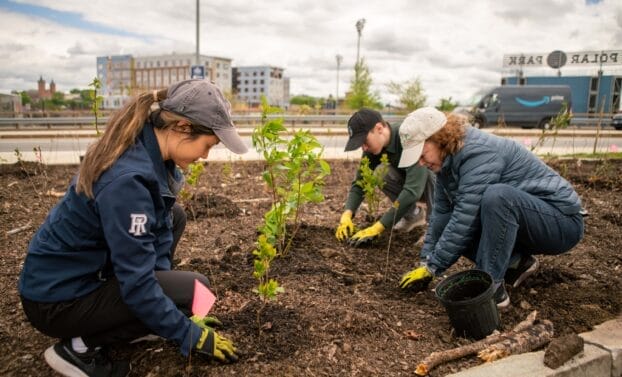Land Lines

Decoding Corruption in Urban Economic Development
By Jon Gorey, February 5, 2026
When an FBI sting in Tallahassee revealed corruption among local economic development officials, Kerry Fang saw a research opportunity. Fang, an associate professor at the University of Illinois Urbana-Champaign and a former Lincoln Institute fellow, discusses insights from her research and why planners need to learn to navigate local politics.
Read the Article
A(lready) D(esigned for) U
By Jon Gorey, February 3, 2026
Cities across North America are providing residents with pre-approved building plans for accessory dwelling units, or ADUs, to help homeowners add housing to established neighborhoods. This StoryMap is a collection of pre-approved ADU designs and floor plans from Seattle to Roanoke, Va.
Read the Article
Seven Need-to-Know Trends for Planners in 2026
By APA Foresight team, December 23, 2025
In January, the American Planning Association (APA) will publish the 2026 Trend Report for Planners in partnership with the Lincoln Institute of Land Policy.
Read the Article
Planning for a Just Transition in the California Delta
By Jon Gorey, December 15, 2025
Some 50 miles inland from the iconic San Francisco Bay, subsidence and saltwater intrusion are complicating life in the California Delta. A series of participatory scenario planning workshops focused on salinity management is helping community members discuss and better understand the available solutions.
Read the Article
Farms, Forests, and Funding: Innovations in Conservation Finance
By Jon Gorey, December 1, 2025
The stakes are high, and so are the costs. Conservationists around the world are using innovative approaches to fund the protection of threatened species and places.
Read the Article
Inviting Investors to Put Their Money Where Their Mission Is
By Jon Gorey, October 31, 2025
An event that felt like an altruistic episode of Shark Tank played out in Boston at the Accelerating Community Investment initiative’s latest investor challenge. ACI now includes more than 100 member organizations in 18 states, as well as a network of more than 50 investors.
Read the Article-
Fellows in Focus
Guiding Greenways in New Ways
By Jon Gorey, January 7, 2026 -
President’s Message
Public Land for Public Good
By George W. McCarthy, November 10, 2025 -
Fellows in Focus
And Then There Were Numbers: Infrastructure, Economics, and Agatha Christie
By Jon Gorey, October 21, 2025 -
Data Drain: The Land and Water Impacts of the AI Boom
By Jon Gorey, October 17, 2025 -
Unlocking Climate Resilience Through Land Value Capture
By Yamini Nagam, Patrick Welch, and Jon Gorey, October 7, 2025

Current issue:
Fall/Winter 2025
About Land Lines
Connecting the dots between our expertise and major global challenges, our free magazine shows why land policy matters.
Housing

Understanding Heirs Property
By Jon Gorey, July 11, 2025
Housing Design Has to Evolve
By Lynn Richards, April 15, 2025
A(lready) D(esigned for) U
Property Tax
Nature-Based Solutions

Grassroots Conservation (Minus the Grass)
By Jon Gorey, May 7, 2025
Unlocking Climate Resilience Through Land Value Capture




